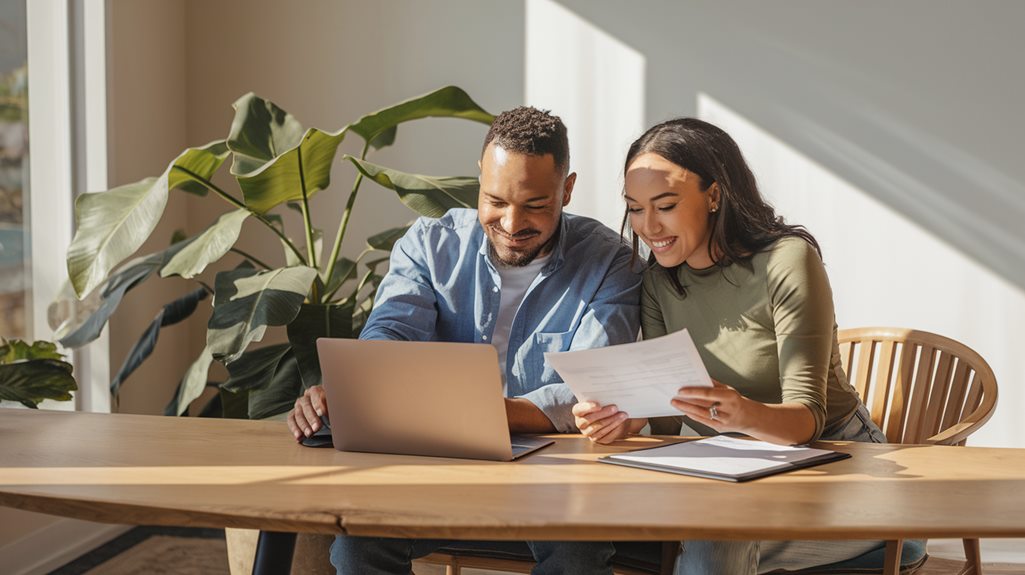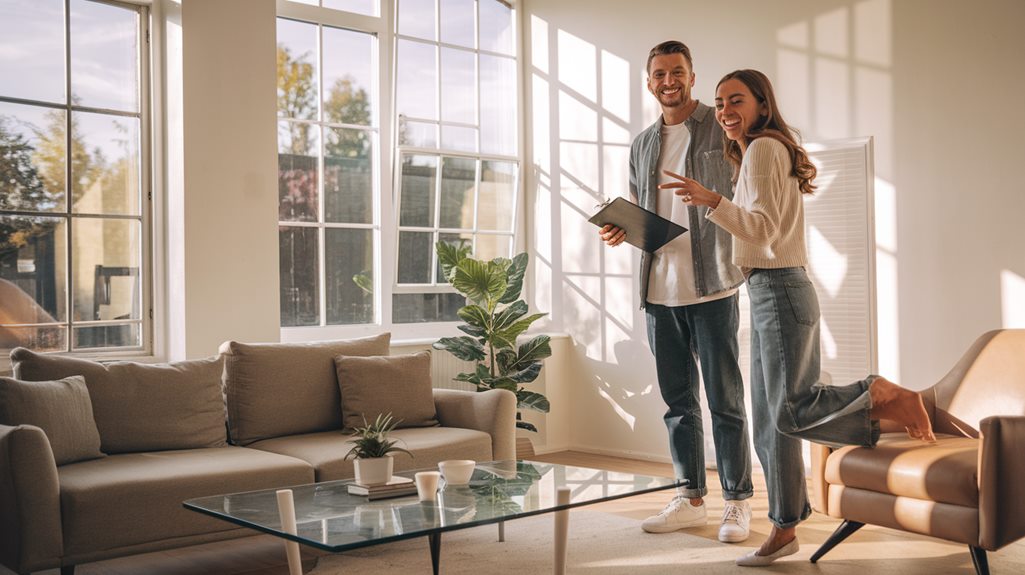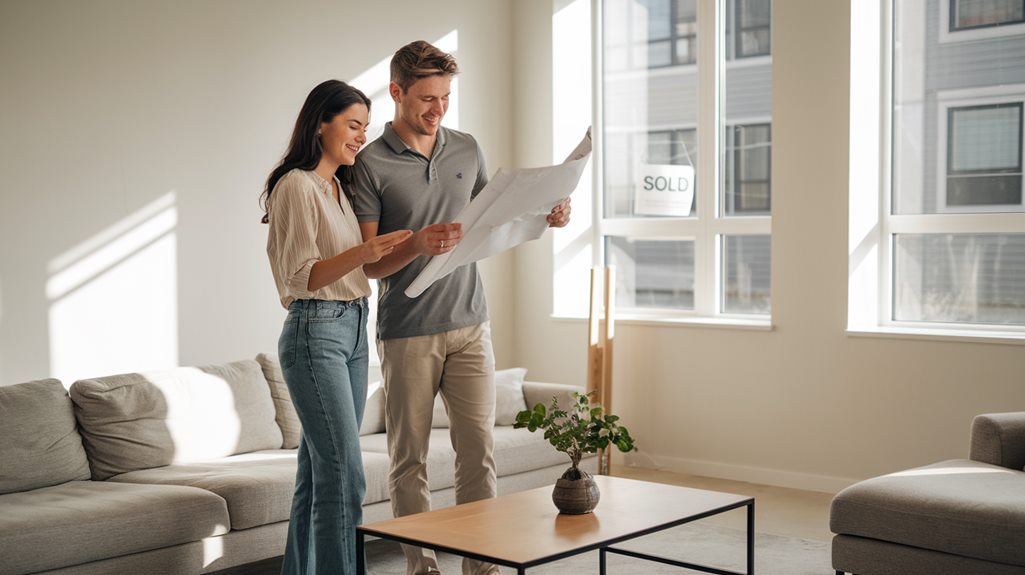Buying a home is an exciting journey! First, check how much money you have. Look at your credit score and try to pay off any debts.
Next, figure out how much you can spend on a home. It's also important to learn about different types of loans.
Getting a mortgage pre-approval can help you feel more sure and make you look good to sellers. Take time to research loan options and find a good real estate agent who can help you.
Think about what you really want in a home. Go to open houses to see what's out there. Keep an eye on what's happening in the market and what neighborhoods are nice. This will help you understand how much homes are worth.
When you find the right home, make a smart offer based on what you've learned. Following these steps will help you find the perfect place to call home!
Ready to start building equity in your own Michigan home? Get your personalized home loan quote today.
Assess Your Financial Health

Starting the journey to buying a home is exciting! But first, it's important to check how healthy your money situation is. One big part of this is your credit score. Lenders look at this score to decide if they'll lend you money. A good credit score can help you get lower interest rates, which means you'll pay less money over time for your home.
To make your credit score better, try to pay your bills on time. It's also helpful to pay off any debts you have and to not ask for new credit too often.
Next, make a plan to save money. Think about how much you need for a down payment and set a goal. You can make saving easier by putting money aside automatically, so it grows little by little.
Michigan residents, unlock the door to your new home. Request your home loan quote from Treeside Financial today.
Determine Your Budget
To figure out your budget, start by looking closely at your money.
Check how much you earn and how much you spend. Don't forget about any debts you have too.
Think about different loans you can get, as they'll change how much you can spend on a home.
Assess Financial Health
Before you start looking for a house, it's really important to check how your money is doing. First, take a look at your credit score. This number helps lenders see if you can borrow money for a home.
Next, make a plan to save some money. It's good to have some extra cash for emergencies, too.
Try to pay off any debts you have. This will help you borrow money more easily.
You might be closer to buying your home than you think
Take our 2-minute home buyer readiness quiz to see how prepared you really are – no credit check required.

Look at how steady your job is by checking your pay stubs and work history. You want to make sure you can keep up with mortgage payments.
Keep track of where your money goes. This can help you find ways to save and stick to your budget.
Also, think about how buying a new home fits into your other money plans. These steps will help you be ready for a successful home purchase!
Consider Loan Options
Choosing the right loan can help you reach your money goals. First, think about fixed rates and adjustable rates. Fixed rates stay the same, so you know what to expect. Adjustable rates might start lower, but they can change later.
Next, look at how long you want to pay back the loan. Shorter loans mean higher monthly payments, but you pay less interest in the long run.
Also, think about how much money you can put down at the start. A bigger down payment can lower fees and help you avoid extra insurance costs.
Your credit score is very important too. It helps lenders decide if they'll give you a loan and what interest rate you'll get.
Make sure to check your debt-to-income ratio to see if you can afford the loan.
If you can, check out government loans. They often have good terms.
Lastly, take your time to look at different loan options from various lenders. This way, you can find the best one that helps you become a homeowner.
Secure Mortgage Pre-Approval

Getting a mortgage pre-approval is an important step when buying a home. It shows sellers that you're serious and helps you know how much money you can spend.
First, check your credit score. This score helps decide what kind of loan you can get. If your score is high, you might get lower interest rates, which can save you a lot of money over time.
Next, gather important papers like pay stubs, tax returns, and bank statements. This will make things easier for the lenders to see how much money you have and what you can afford.
When you get pre-approved, you become part of a group of smart buyers. You'll feel more confident as you look for your new home.
Getting pre-approved is an exciting step toward finding the perfect place to live!
Research Mortgage Options
When you're looking for a mortgage, it's really important to check the interest rates from different banks. This helps you find the best deal for your money.
You should also learn about the different types of loans, like fixed-rate and adjustable-rate mortgages. This way, you can pick the one that fits your needs for the future.
If you take some time to look at these things, you could save a lot of money and make buying a home easier.
Compare Interest Rates
When looking for a mortgage, it's really important to pay attention to interest rates. These rates can change a lot, and they affect how much you'll pay each month.
You need to think about whether you want a fixed rate, which stays the same, or a variable rate, which can go up or down. If you think rates might go down, a variable rate could be a good choice.
Here are some easy steps to help you:
- Look at Current Rates: Interest rates can change fast. Keeping an eye on them can help you make good choices.
- Check Different Lenders: Each bank or lender might offer different rates and deals. It's smart to compare them.
- Think About Your Goals: Make sure the interest rate you choose fits with your money plans for the future. This way, you'll make the best choice for you.
Understand Loan Types
Buying a home is an exciting journey! To help you on this path, it's important to know about the different types of loans you can choose from.
First, there are fixed-rate loans. These loans have steady interest rates, which means your payments will stay the same every month.
Then, there are adjustable-rate loans. These might start off low, but the interest can change as time goes on.
If you have a lower credit score, FHA loans could be a good fit for you. They ask for a smaller down payment.
For veterans, VA loans are a great option. You can get these loans without needing to put any money down.
Conventional loans are common, but they usually require a higher credit score.
If you want to buy a very expensive home, you might look at jumbo loans. These are for amounts that are more than the usual loan limits.
Think about what you can afford, how long you want the loan for, and your credit score. This will help you pick the best loan for you.
Each choice will help you feel at home in your new community, so make sure to choose wisely!
Choose a Real Estate Agent

To have a smooth and happy time buying a home, it's important to pick the right real estate agent.
Start by finding someone who's the right skills for you and talks in a way that makes you feel good. An agent who knows the area well and is good at making deals can really help you.
Look at what other people say about the agent to know if they're reliable and know a lot about the market.
Make sure they've time to help you when you need it. Also, check their fees to see if they fit what you can afford.
Here's a simple checklist to help you choose:
- Agent Skills: Check their training and how long they've been working.
- Talking Style: Make sure they listen to you and reply quickly.
- Local Knowledge: Pick agents who really know the neighborhood.
Choose carefully so you feel supported and happy!
Identify Desired Locations
Finding the right place to live is very important when buying a home. It can change how you feel about where you live and how much your home is worth.
First, think about what you like to do. Do you enjoy parks, shops, or fun places to visit? A lively neighborhood with lots of activities can make you feel happy and connected.
If you have kids or plan to, look into the schools in the area. Good schools can help your home's value go up. Also, check how long it takes to get to work or school. You want to spend more time at home, not stuck in traffic.
Safety is key too. A safe neighborhood helps you feel relaxed. Look into community services, like libraries and parks, that can make life better.
List Must-Have Features

Once you find the perfect place, it's time to think about what you really want in your new home. Make a list of important things that will make you happy and comfortable.
Think about how you want the rooms to look so they fit your family just right.
Here are some important things to think about:
- Energy Savings: Look for homes that keep you warm in winter and cool in summer. This helps you save money on bills.
- Outdoor Fun: Having a yard or garden is great for relaxing and enjoying time outside.
- Space for Your Stuff: It's nice to have enough storage so your things are neat and tidy.
Also, think about how safe the neighborhood is, if there are good schools nearby, and how easy it's to get to work or school.
These things will make your life better and help your home be worth more if you ever want to sell it.
Attend Open Houses
Going to open houses is a fun and important part of buying a home.
It lets you see the neighborhood up close and decide if you like it. You can check out different houses and see what they've that matches what you want.
Evaluate Neighborhood Appeal
Looking at different neighborhoods by going to open houses can help you see what makes a place special. You can learn about parks, shops, and schools.
Watch the people who live there to see if they match what you like. It's also smart to check how safe the area is by looking at crime rates.
Don't forget about how easy it's to get around, like bus stops or trains, and what fun places are nearby. Think about new buildings or stores that might come later and how they could change the neighborhood.
Talk to the people who live there to see if you'd feel at home.
As you check out neighborhoods, remember to:
- Look for parks and community centers.
- Find out how good the schools are and how close they are.
- Check the safety of the area by looking at crime rates.
Compare Property Features
When you look at houses, going to open houses is very important. It lets you see the house and the neighborhood up close. You can't get the same feel from pictures online. As you walk through the rooms, think about how your family would live there. Look at the kitchen, the bathroom, and where you'd store your things.
Also, check out nearby parks or schools that make the area nice. Talk to the agent who's showing the house. They can tell you about the property and the neighborhood. Ask if there are any new buildings coming that might change things.
As you visit, notice what the neighborhood feels like. This helps you imagine living there. By going to open houses, you'll feel more sure about picking the right home for you and your family.
Assess Market Prices
Knowing how much homes cost is really important when you're looking to buy one. Going to open houses is a great way to learn about prices. When you visit these homes, you can see how much they're worth and what the local prices are like.
Here's why going to open houses is helpful:
- Look at the homes: You can see how well different houses are taken care of. This helps you know how much they might cost.
- Check out the neighborhood: You can feel the community and see what fun things are around. This can change how much a home costs.
- Talk to real estate agents: You can ask them questions to learn more about home prices and what's happening in the market.
Going to open houses makes you feel more involved and helps you understand what to look for when buying a home.
Evaluate Market Trends

When you want to buy a home, it's important to look at the market trends. This means you need to know how many houses are for sale and how many people want to buy them in the area you like.
Check to see what experts say about the future of housing prices and how they might go up or down.
Also, think about the time of year. Sometimes, there are better deals to find in certain seasons.
Look at what makes a neighborhood special. Good schools, parks, and stores can make a place more fun and a smart choice for your future.
Stay updated on any news that could change your plans.
Make an Offer
You've found your dream home in a nice neighborhood. Now it's time to make an offer! Here are some easy tips to help you do it:
- Look at Similar Homes: Check what other homes like this one have sold for. This will help you understand how much to offer.
- Write a Nice Note: Tell the seller why you love their home. A sweet letter can make a big difference!
- Be Flexible: If you can, try to work with the seller's schedule. If they need more time, say yes! This can make your offer stand out.
Using these tips can help you get that home you really want!








